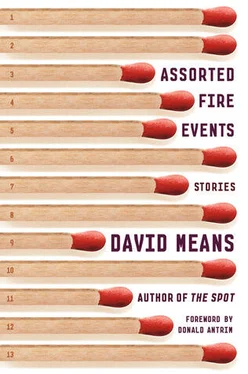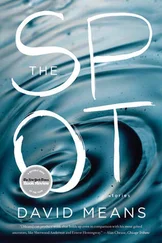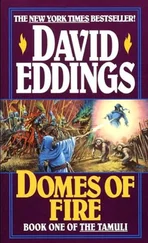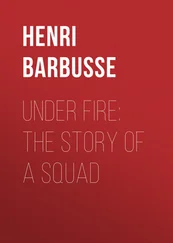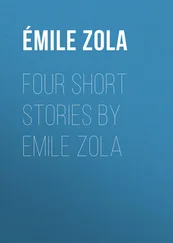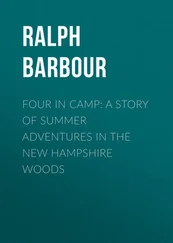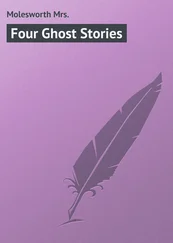David Means - Assorted Fire Events - Stories
Здесь есть возможность читать онлайн «David Means - Assorted Fire Events - Stories» весь текст электронной книги совершенно бесплатно (целиком полную версию без сокращений). В некоторых случаях можно слушать аудио, скачать через торрент в формате fb2 и присутствует краткое содержание. Год выпуска: 2012, Издательство: Faber & Faber, Жанр: Современная проза, на английском языке. Описание произведения, (предисловие) а так же отзывы посетителей доступны на портале библиотеки ЛибКат.
- Название:Assorted Fire Events: Stories
- Автор:
- Издательство:Faber & Faber
- Жанр:
- Год:2012
- ISBN:нет данных
- Рейтинг книги:4 / 5. Голосов: 1
-
Избранное:Добавить в избранное
- Отзывы:
-
Ваша оценка:
- 80
- 1
- 2
- 3
- 4
- 5
Assorted Fire Events: Stories: краткое содержание, описание и аннотация
Предлагаем к чтению аннотацию, описание, краткое содержание или предисловие (зависит от того, что написал сам автор книги «Assorted Fire Events: Stories»). Если вы не нашли необходимую информацию о книге — напишите в комментариях, мы постараемся отыскать её.
won a Los Angeles Times Book Prize, was nominated for a National Book Critics Circle Award, and received tremendous critical praise. Ranging across America, taking in a breathtaking array of voices and experiences, this story collection now stands as one of the finest of our time.
Assorted Fire Events: Stories — читать онлайн бесплатно полную книгу (весь текст) целиком
Ниже представлен текст книги, разбитый по страницам. Система сохранения места последней прочитанной страницы, позволяет с удобством читать онлайн бесплатно книгу «Assorted Fire Events: Stories», без необходимости каждый раз заново искать на чём Вы остановились. Поставьте закладку, и сможете в любой момент перейти на страницу, на которой закончили чтение.
Интервал:
Закладка:
“What are you laughing about?”
“Nothing.”
“Come on.”
“The foolishness of the world,” Stanley said.
Out the windows the afternoon was waning. Beams of orange cut back between buildings in Jersey. The elongated shadows of buildings pressed behind the view.
It was never spoken of again, that scene, that moment in the hospital corridor. It didn’t go down in family lore. It didn’t go anywhere except for that moment into the smile on Stanley’s face, the thing Tara’s father saw when he entered back into the Shiva.
THE GESTURE HUNTER
I’M INTERESTED in how people go about their daily lives. You know, how they bide their time, what they fill all that time up with. Not the big motions but the little ones, I suppose: someone hanging clothes on an old-fashioned line, breaking with the convention of the gas dryer, the fluid motion of her arms lifting the sheets, a wooden pin between her teeth, the sway of the line, laden with windblown sheets, in relation to how she bends up to it in greeting; a guy at the gas station helping the full-service customers, his foot on the black slab of rubber bumper, leg jittering hard as he pumps, the car rising and falling gently while his oblivious eyes stay cocked to some lost point on the horizon and he plucks at the stains under the arms of his green sweatshirt. I’m a gesture hunter. I seize moments. I care fully about them.
It was one of those days typical to our town, which is along the Hudson, just twenty-odd miles up from the city. I mean that the day had settled into the town and the town into the day — clear and sunny with just an edge of cool to the wind, which ruffled the surface of the river white and was strong enough to cause a few waves to curl up but not really break. (Most of the waves on the Hudson have a certain pathetic quality: weak-lipped, shaky. So do the boats, working the strange wind patterns, mainly from the north, trying to buck the tidal currents, coming about and then landing in irons in mysteriously dead winds beneath the Tappan Zee Bridge; nothing fluid or graceful about any of it.) It’s odd that I can’t tell exactly if it’s the day coming into the town or the town coming into the day when I start out on these searches, especially in the morning — I start early sometimes — when the light is still low and silvery. But as I said, this was, it seemed, nothing but a typical day on all accounts, except that it was morning and I had started out rather early. I can’t say now that I felt at that moment — as I made my first slow sweep through the center of town, taking Broadway (doesn’t every town near the city have its own futile Broadway?), driving my usual five miles an hour — that I felt any sense of betrayal; I mean that I did not think the day had anything betraying in it destined for me. But days do that. A day can betray you. You invest in it and it gives something back you didn’t expect. I saw from the corner of my eyes a man leaving the police station; he had a slow, elderly walk — very much like mine — a pale yellow shirt, and one of those crushable canvas hats you might use for fishing; he was moving with his slow gait down the wheelchair ramp. Along the other side of the street, in front of one of the many antique shops (those scandalous resellers and repackagers of the past) that have given our town a place on the map, someone, lifting something, was halfway through the door. I saw just the back end of the man: his Wrangler jeans, his hip, and the edge of whatever he was carrying, dark oak maybe, and the buffed metal frame of the door. Nothing worth noting. A gesture, certainly, but not the kind I wanted. I needed the whole thing, united and graceful and, most of all, full of revelation, stark wonderful revelation; a young man carrying a table into a shop didn’t cut it. Ahead, the light was green; farther ahead, maybe a block or two, one of those big, bulky, stupid emerald four-wheel beasts that roam our streets.
Let me here just make some notes, add some things: you see this is near the end of the century and certain movements of small towns as I used to know them, as I knew them growing up, are waning. When I was a boy in Galva, Illinois, there were wakening gestures to a town. All towns had them. They were infused with grace. Mr. Bursell of the dry goods store would waken in his little apartment over his store — moving with the deliberate, uncaring slowness of a permanent bachelor, lifting the spilled flower of his blue dungarees around his waist, looping the belt slowly as he looked out his window, across the street where Ellen Barton was sweeping the sidewalk in front of her husband’s movie theater, The State. Ah, that gesture, the broom wedded to her arm and her arm to the broom and the swish motion, elbow bent, and the bits of ticket stub and tissue and popcorn being forced forward into the gutter. Her cool honey hair up in a clip. The bleached pleats of her skirt around her ankles. Bursell would study that movement for a moment, fingers on his belt, and then make his way downstairs, going out the front, so he could crank the awning open over his store to hold the morning sunlight (later in the afternoon he’d do the same in reverse), taking the worn wooden spool that steadied the bar with one hand while with the other he had to crank. His cranking would lead the awning, tart green and white stripes, to open gracefully — his work taking shape and form over his head. That’s how it used to be in a town that wasn’t betrayed yet by the onslaught that would eventually take so many of the finer gestures out of our hands; stolen from us, taken into the innards of so many machines.
We are the graceless and dumbfounded, insane with our own insatiable desire for another time and place and a sense of movement, we gesture hunters. One movement of a tongue over a dry lip will do for us; a women in the graveyard weeping at the foot of her husband’s grave, her navy blue skirt hiked up over her calves, and the flat worn soles of her shoes the color of dry sand — that’s just it, all we need, all we strive for in this world, nothing more or less. We have our modus operandi, our techniques, some preferring to await the passing of some perfect movement, to sit all day, day upon day, waiting. It’s a heartless means of searching, I think, to let the movement of the town go about you, but there are those, my fellows, who are content to work that way; and I say, go your way in peace. In town there are two such operators, though their intentions I have to doubt somewhat; their desires are not so pure as mine. With his hair gone and blotches of Vietnam — napalm, some say — purpling his scalp, Hank sits patiently, welded to a bench, but his searches are invalidated by his heaving sucks from a tall-boy, the paper sack tight around the top of the bag and wet from condensation. And there is an old hag nicknamed Boop — a la Betty — who smells of urine and wears stained nylon stockings and tattered dresses but doesn’t bring even the slightest glance from passerbys as she maintains her place on the bench in front of the ice-cream shop, making her sputtering, inane sounds, clucks and quacks and hisses and an occasional word or two, maybe searching or maybe not. It’s hard to know what to think of her, and I seldom do think of her if I can help it, but I do know that maybe at one time she was a gesture hunter, too, and went about it firmly and with all the good intentions one might expect. Long ago, when time was different and we were going about our business in town, she was the big realtor (and I, at the bank, the largest lender of funds). Then, as now, it was the duty of a realtor to bend and flex her personality to match those of a potential buyer, even going so far as to match him gesture for gesture when necessary: she might be standing in an inelegant little Cape Cod, with a bad roof of sagging rafters and a main beam ridden with termites, and still she’d have to throw her arms wide in one of those open embraces and take a deep chest-heaving breath of air as if it were the freshest in the world to match the gesture of the buyer, who, coming up from the city for a summer day of looking around, had happened into her office just to see what was available and, after seeing the Cape Cod, felt suddenly stunned by the idea of living in “the country.” So with Boop it was hard to know; she’d stolen so many gestures, hugged them to her, that maybe she was looking for one of her own that had become lost out there. That’s the basic nature of any of us hunters. We want above all to find what is rightfully ours.
Читать дальшеИнтервал:
Закладка:
Похожие книги на «Assorted Fire Events: Stories»
Представляем Вашему вниманию похожие книги на «Assorted Fire Events: Stories» списком для выбора. Мы отобрали схожую по названию и смыслу литературу в надежде предоставить читателям больше вариантов отыскать новые, интересные, ещё непрочитанные произведения.
Обсуждение, отзывы о книге «Assorted Fire Events: Stories» и просто собственные мнения читателей. Оставьте ваши комментарии, напишите, что Вы думаете о произведении, его смысле или главных героях. Укажите что конкретно понравилось, а что нет, и почему Вы так считаете.
